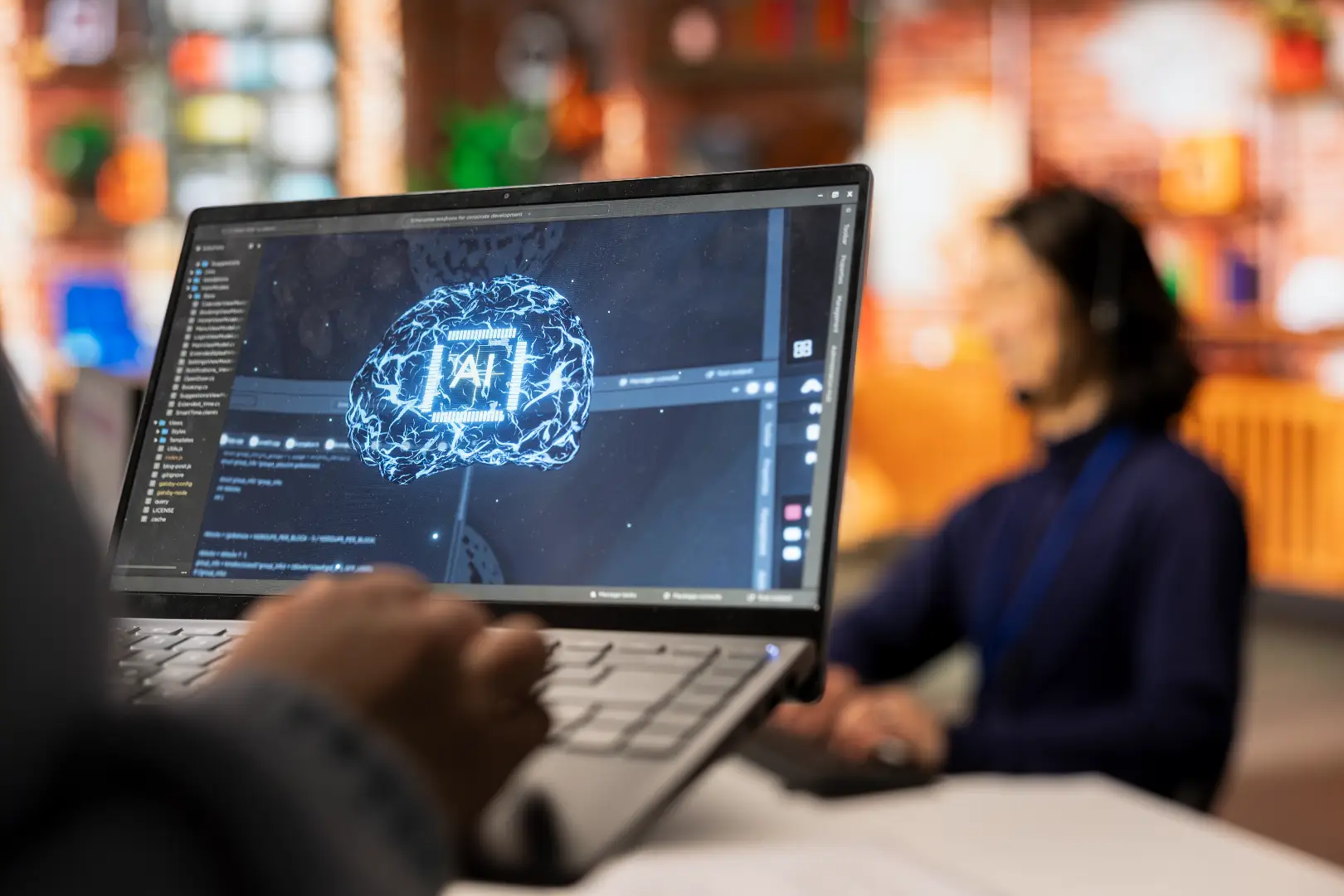Introduction: Why 2025 Is a Turning Point for AI
Artificial intelligence (AI) is no longer a vision of the future but is already here, it’s mainstream, and it’s revolutionizing the way we live and work in 2025. From digital automation to predicting customer behavior and even designing new products, AI has evolved into the driving force behind innovation in most industries.
Companies that previously viewed AI as discretionary now understand it’s essential to the survival of their businesses. A new report by PwC calculates that AI will add more than $15.7 trillion to the world economy by 2030, with the largest effect occurring from 2025 to 2030.
But with this expansion is disruption. Whole jobs are being remade—or even eliminated—by AI-driven software. Simultaneously, entirely new career paths are being created. Knowing where these changes are occurring is critical for businesses and professionals alike.
So, let’s take a look at the top 10 artificial intelligence trends in 2025 that are revolutionizing business and the workplace.
- The Death of DevOps Jobs
DevOps engineers in 2025 are watching aspects of their jobs get automated by AI. AI-powered continuous integration platforms, Harness, and GitHub Copilot now perform jobs such as bug detection, deployment pipelines, and monitoring.
For instance, Netflix and Spotify utilize AI to forecast and correct infrastructure breakdowns before they affect customers. Something that could previously be handled by squads of DevOps engineers is now achievable by a smaller team using AI-enabled monitoring tools.
Is DevOps dead? Not exactly. Rather, the role is changing. People who change by acquiring AI-based cloud orchestration or machine learning-based system monitoring skills will remain relevant. People who don’t risk being replaced.
- QA Testers Being Overtaken by Automated Testing
Quality Assurance (QA) testing has heretofore depended on groups of engineers writing test cases by hand and debugging them. With AI, however, businesses can now automate regression testing, usability testing, even stress testing.
Platforms such as Testim and Applitools employ computer vision and machine learning to identify bugs in real-time. Shopify, for example, embraced AI testing frameworks that cut down their manual QA staff by almost 30% and streamlined release cycles.
This is not to say that humans are gone. Human judgment is still needed for complicated edge cases, out-of-the-box testing, and user-experience verification. But the classic QA function is rapidly diminishing.
- Customer Support Teams Disappearing
Customer support is among the most noticeable domains where AI is supplanting human efforts. AI-driven chatbots, such as those employed by Amazon and banks across the globe, can now resolve 70–80% of customer queries without the intervention of humans.
By 2025, sophisticated multilingual AI chat platforms with emotional sentiment analysis enable businesses to support global customers with minimal personnel. Fintech firms in Asia, for instance, now employ AI bots that answer loan questions, monitor transactions, and walk users through tasks—functions previously done by human call centers.
What’s left for humans to do? High-touch customer success, escalations, and relationship building. But entry-level customer service positions are disappearing at a furious rate.
- Entry-Level Engineers Replaced with AI Coding Assistants
Most students joining the job market in 2025 believe they will get entry-level software jobs. But here’s the bitter truth: AI assistants such as GitHub Copilot X, Replit Ghostwriter, and Google’s Codey are doing a lot of the “junior-level” coding work.
Activities such as boilerplate code writing, debugging, or making generic APIs are automated now. A startup previously requiring five junior engineers can now work with one senior engineer with the help of AI assistants.
This change does not take away opportunities but increases the threshold. To remain competitive, new graduates need to work on problem-solving, system design, and applying AI to real-world problems rather than acquiring syntax.
- Data Analysts Under Threat of Automation
Data analysis was at one time a future-proof profession. But in 2025, most descriptive and diagnostic analytics work is automated. AI tools such as Tableau GPT, Microsoft Fabric, and Google Looker examine datasets, produce insights, and even create visualizations by themselves.
For instance, Coca-Cola employs AI-driven analytics to forecast sales patterns and consumer behavior globally without the requirement of large groups of analysts.
Still, the future isn’t all bleak. Analysts who transition into data storytelling, strategic insights, and AI model validation will remain valuable. The routine spreadsheet-heavy jobs, however, are vanishing quickly.
- System Administrators Becoming Obsolete
System administrators—once the backbone of IT departments—are increasingly redundant. Cloud providers like AWS, Azure, and Google Cloud now offer self-healing infrastructure that scales automatically.
Such tasks as server provisioning, backups, and monitoring are performed with little human intervention. Indeed, by 2025, 85% of businesses utilizing cloud services no longer have full-time system administrators.
The future is in cloud architecture, security, and AI-driven infrastructure design rather than in sysadmin tasks.
- Project Coordinators Replaced by AI Scheduling Tools
Another vanishing job is that of project coordinator. AI-powered platforms such as ClickUp AI, Asana Intelligence, and Microsoft Copilot now schedule, allocate resources, and generate reports automatically.
Rather than follow team progress manually, AI tools offer real-time dashboards and even trigger automatic reminders to the team.
This doesn’t imply that project managers have disappeared—their leadership and decision-making are more important than ever. But the administrative, coordinator-type roles are becoming obsolete.
- AI Creating Entirely New Jobs
While there are some jobs becoming extinct, AI is also generating entirely new professions in 2025. They are:
AI Trainers – Experts who “train” AI models on datasets.
Prompt Engineers – Specialists at developing queries and instructions for best AI outcomes.
AI Ethics Managers – Experts making sure there is compliance, fairness, and transparency in using AI.
Synthetic Data Specialists – Experts who create artificial data for training models.
These new positions demand creativity, strategy, and human judgment, demonstrating that while AI streamlines mundane tasks, it still requires humans at the controls.
- The Most Vulnerable Industries To AI In 2025
Every industry is not equally threatened. In 2025, the most vulnerable industries are:
Banking & Insurance – AI chatbots and fraud detection cut human agents.
Retail & E-commerce – AI shopping assistants that personalize shopping eliminate marketing and sales positions.
Healthcare Administration – AI applications automate billing, scheduling, and diagnosis.
Manufacturing – Robotics with AI eliminates low-skill assembly-line jobs.
Highly data-processing-intensive industries and repetitive activities are automating at the quickest rate.
- How to Future-Proof Your Career in the Age of AI
Rather than worrying about AI, professionals must adapt and utilize it. Follow this step-by-step approach:
Reskill Ongoing – Master AI applications in your field.
Emphasize Human Skills – Creativity, strategy, and emotional intelligence can’t be automated.
Be Flexible – Be open to shifting into new jobs as industries evolve.
Utilize AI, Don’t Battle It – Utilize AI to make you more productive instead of viewing it as competition.
Establish a Personal Brand – With a populated job market, visibility and expertise are more important than ever before.
Conclusion: The AI Shift Is Here—Are You Ready?
2025 is the year that marks a shift in business operation and professional work. Artificial Intelligence Trends 2025 demonstrate that jobs previously thought to be secure are now at risk, while new ones open up in unexpected fields.
The golden rule? AI isn’t replacing humans—it’s replacing tasks. Those who learn, reskill, and adapt will prosper. Those who don’t might end up being left behind.
Companies that wisely integrate AI will have an edge, and employees who adapt will be at the forefront of the next wave of innovation.
The future isn’t human versus AI—it’s AI and human collaboration to make smarter, more efficient, and more effective businesses.









